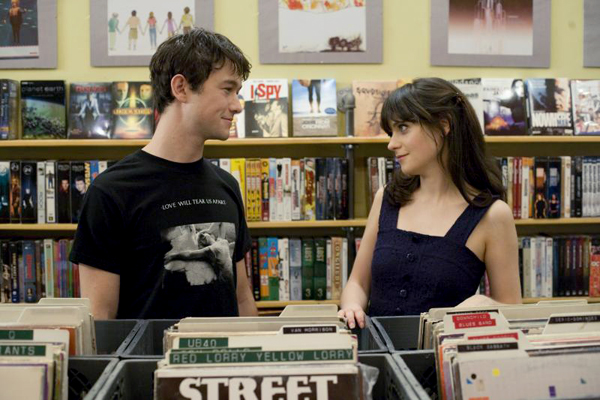|
Reviews of Recent Independent, Foreign, & Documentary Films in Theaters and DVD/Home Video

(500) DAYS OF SUMMER Summer (Zooey Deschanel) is not a normal girl. She’s different, and she knows it—mostly because men won’t let her forget it. Every guy she meets adores her. Her favorite Beatle is Ringo Starr—not because she particularly loves his music, but because he’s not adored in droves like Paul or John. He’s just Ringo, the Beatle no one fawns over or commemorates parks after. Anonymity is a quality Summer idolizes because it’s something she’s never felt before—the grass is always greener. Tom (Joseph Gordon-Levitt) is a normal guy. No one fawns over him or commemorates parks in his name. He’s just a sensitive twentysomething who’s stunned when Summer, an assistant at Tom’s greeting card company, comments on his choice of music after overhearing his loud headphones in an elevator. A pretty girl who listens to the Smiths? Impossible. And she noticed him? Unbelievable. That these are not necessarily fated or exceptional qualities takes Tom 500 days to figure out. Because he thinks Summer is the most beautiful woman he could ever meet, she truly is that beautiful for him. Cutting back and forth through different days in their relationship and breakup like a time machine with a tendency towards ironic juxtapositions, music video director Marc Webb tours significant memories of Tom’s 500 days of meeting, loving, hating, reconsidering, and finally getting over Summer, his dream girl. What Gordon-Levitt simulates well here is the masculine softie. He plays Tom with a deft mix of little man syndrome and plucky cute-dork aplomb that makes his character’s story arc more believable than the writing warrants. Tom’s swelling of feeling for the wrong female is the kind of unfortunate love that you can’t imagine not having once begun—even if you’re not loved back in the precise manner you would prefer. Summer tells Tom throughout their relationship that she doesn’t want to be in a relationship, but Tom ignores this again and again. It’s ridiculous. But it’s also something everyone’s felt before. However, writers Scott Neustadter and Michael H. Weber (the creative team behind Steve Martin’s Pink Panther 2) don’t portray Tom and Summer’s relationship well. The characters are modern archetypes, and their situation rings true, but the storyline is so forced and the writing so cocksure of its own unconventionality that you can’t help feeling burdened by the film’s fictitiousness. You’ll side with Summer in thinking that their relationship is a sham. By rewinding and fast-forwarding through Tom’s memories of his relationship with Summer, there’s an inherent focus on relationship highlights. It’s a clever idea because we get to see all the big events and the little moments that become iconic after a breakup. But their love lacks the connective tissue to convince viewers that what they’re seeing in the film’s first half could have such a devastating effect on Tom in the second half. No matter
how charismatically Gordon-Levitt and Deschanel play young urban lovers,
overwrought writing brings the film down, with too many contemporary
references abounding. (The denouement involves a girl named Autumn.).
The overuse of music from Feist, the Doves, the Smiths, and multiple
songs from Regina Spektor only heighten how much the film creators are
intentionally or unintentionally chasing a quirky “adult contemporary”
label. Not coincidentally, the producers and editors of 2008’s Juno
are also at work here.
Zachary Jones
|

